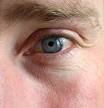Dermal Filler vs. Eyelid Surgery For Tear Troughs
One of the most common problems I see at Hess Plastic Surgery is the tear trough deformity. This is t he depression that can occur between the nose and the lower eyelid. This tends to occur with increasing age as the lower lids weaken and intraorbital fat begins to push out against the lower lid skin. In addition the descent of the cheek fat emphasizes this depression. The question is how to deal with it. Is it better to have fat redraping or injection of dermal fillers?
he depression that can occur between the nose and the lower eyelid. This tends to occur with increasing age as the lower lids weaken and intraorbital fat begins to push out against the lower lid skin. In addition the descent of the cheek fat emphasizes this depression. The question is how to deal with it. Is it better to have fat redraping or injection of dermal fillers?
Fat redraping involves a blepharoplasty in which an incision is made in the inside of the lower lid and the fat is teased out from the orbit and is laid over the orbital rim. This has the “killing two birds with one stone” effect as the tear trough is filled with the fat and the bulging of the lower lid is reduced because the fat has been displaced, decreasing the pressure on the skin of the lower lid. The problem with this is that the fat may not be smooth resulting in a lumpy appearance.
Dermal fillers are another option to correct this problem. The hyaluronic acid fillers such as Juvederm, Restylane and Perlane are designed to be injected superficially which, in my experience, does not do as well in the lower lids. The skin is thinner and these fillers can to be more visible in the lower lids. I’m a big fan of Radiesse which is composed of hydroxapatite and is intended to be injected deep, close to the bone. This permits elevation of the depression without visibility of the filler.
Both options are acceptable. However, dermal fillers are not permanent but can last up to 2 years. Fat redraping can correct the tear trough depression but not every patient has fat that is amenable to fat redraping. Therefore, my approach is to tell patients that during surgery I will try to redrape the fat. However, if it does not look smooth I will resect the fat and plan for Radiesse injection.
Cosmetic eyelid surgery is a passion of mine. Please see some before and after photos of eyelid surgery then click here or call our office at 703.752.6608 for a complementary consultation with Dr. Christopher Hess.